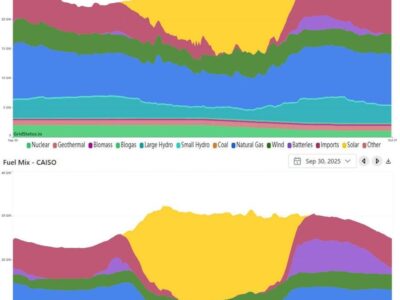Greenhouse Gas Regulations Under the Clean Air Act Are Doomed
Will Kavanaugh Use the Major Questions Doctrine or the Non-Delegation Doctrine to Scrap Them?
The Democratic candidates all have bold plans to attack climate change but face an obvious problem: Congress. Unless the Democrats take the Senate and the Presidency while retaining the House, and unless the Democrats abolish the filibuster, it’s hard to imagine Congress passing comprehensive climate legislation (and even then getting legislation through will be a very tough haul). After all, many Republicans in the House and the Senate don’t even acknowledge the existence of the problem, let alone want to do anything about it. And so, like President Obama before them, any Democrat in the White House will try to use executive power under the Clean Air Act to regulate greenhouse gases. That’s how we got the Clean Power Plan, regulations of methane, and standards for carbon emissions from cars and trucks. These were the centerpieces of the Obama Administration’s commitment to the global community under the Paris Agreement about how and by how much the U.S. would reduce its greenhouse gases. The Democratic candidates are all pledging to go beyond President Obama’s Paris commitments. But even to restore the programs his administration adopted will require that a Democratic President use executive power under the Clean Air Act.
It has been clear for some time that Justice Brett Kavanaugh will vote against any expansive use of executive power to regulate carbon pollution. Yesterday, we got even more evidence that he will strike down EPA regulations of greenhouse gases. As Dan explained here, Kavanaugh issued an explanatory opinion in a case the Supreme Court decided not to take up that adds a new legal argument he will use to dismantle carbon regulations. The only question now is whether he will use what is known as the “major questions” doctrine, the “non-delegation” doctrine, or some combination of the two to strike them down.
Kavanaugh has already authored a dissenting opinion on the court of appeals in a case that eventually went up to the U.S. Supreme Court, UARG v. EPA, that would have struck down EPA regulations under the “Prevention of Significant Deterioration” program for new sources of greenhouse gases. He would have used some version of the major questions doctrine to do so. Air pollutants, in his view, did not include greenhouse gases for the PSD program even though Massachusetts v. EPA said they did for tailpipe pollution. As he made clear in another case:
EPA’s well-intentioned policy objectives with respect to climate change do not on their own authorize the agency to regulate. The agency must have statutory authority for the regulations it wants to issue. … Congress’s failure to enact general climate change legislation does not license an agency to take matters into its own hands, even to solve a pressing policy issue such as climate change.
This language is essentially a recitation of the major questions doctrine. An agency cannot regulate on a major issue like climate change unless Congress has been very clear that it intended to have the agency do so. The major questions doctrine — notoriously muddy and difficult to apply – was summed up by Justice Antonin Scalia in the UARG case:
When an agency claims to discover in a long-extant statute an unheralded power to regulate “a significant portion of the American economy,” Brown & Williamson, 529 U. S., at 159, we typically greet its announcement with a measure of skepticism. We expect Congress to speak clearly if it wishes to assign to an agency decisions of vast “economic and political significance.”
Kavanaugh has already signaled in many ways that he views climate change regulation “with a measure of skepticism” and will at best uphold only very limited regulations that are clearly compelled by the text of the statute. At worst he would use the major questions doctrine to overturn Massachusetts v. EPA.
Now, he has signaled a new argument he will use. In yesterday’s denial of the certiorari petition in a case called Paul v. United States, Kavanaugh tipped his hand that he will join the four other conservatives on the Court in resurrecting the non-delegation doctrine. The basic idea of the doctrine is that Congress can only delegate very limited power to federal agencies to implement federal statutes — otherwise it is unconstitutionally granting those agencies legislative power that only Congress possesses. It has been more than 80 years since the Supreme Court struck down a statute on non-delegation grounds – it was one of the tools the anti-regulation Supreme Court of the 1930s used to strike down New Deal legislation. But in a case decided earlier this year just before Kavanaugh joined the Court, in Gundy v. United States, the four conservative justices (Gorsuch, Roberts, Alito and Thomas) in a dissenting opinion indicated they would have struck down a federal statute involving criminal sex offenders under the non-delegation doctrine. Yesterday, Kavanaugh had this to say about his own views on the long-dormant doctrine:
the Court has not adopted a nondelegation principle for major questions. But the Court has applied a closely related statutory interpretation doctrine: In order for an executive or independent agency to exercise regulatory authority over a major policy question of great economic and political importance, Congress must either: (i) expressly and specifically decide the major policy question itself and delegate to the agency the authority to regulate and enforce; or (ii) expressly and specifically delegate to the agency the authority both to decide the major policy question and to regulate and enforce.
The opinions of Justice Rehnquist and JUSTICE GORSUCH would not allow that second category—congressional delegations to agencies of authority to decide major policy questions—even if Congress expressly and specifically delegates that authority. Under their approach, Congress could delegate to agencies the authority to decide less-major or fill- up-the-details decisions.
Like Justice Rehnquist’s opinion 40 years ago, JUSTICE GORSUCH’s thoughtful Gundy opinion raised important points that may warrant further consideration in future cases.
So now, the legal basis Kavanaugh is likely to use for striking down any attempts by EPA to regulate carbon pollution will look something like the following: Congress has not specifically addressed the question of climate change in the Clean Air Act (even though the definition of air pollution is very broad, as the Massachusetts v. EPA Court found) and the question of whether to regulate carbon emissions is a major question; moreover, even if Congress had spoken about climate change, it cannot simply delegate to EPA the authority to interpret general phrases like “the best system of emission reduction” (the basis for the Clean Power Plan); or requirements for new sources of carbon pollution (the basis of the regulations partially upheld in UARG); or even, potentially, California or EPA authority to regulate carbon emissions from the tailpipes of cars and trucks (despite Massachusetts v. EPA). If Congress wants to legislate on climate change, not only must it do so expressly but it must do so in very specific, precise ways that leave little discretion to an expert agency like EPA.
The non-delegation doctrine could be used to go even further to undermine more general air pollution regulations under the Clean Air Act, regulations directed at ozone, particulate and other pollution. There is some reason for optimism on these fronts, however, at least with respect to Kavanaugh’s vote. He authored an opinion, for example, upholding the 2013 National Ambient Air Quality Standard for fine particulate matter in National Association of Manufacturers v. EPA as “consistent with the general principle that the Clean Air Act gives EPA substantial discretion in setting the NAAQS.” As Dan suggests, he seems to be signaling that his use of the non-delegation doctrine will be limited to major questions, though how he would actually make distinctions between major and minor questions and how specific Congress must be in legislating at this point is unclear (as is Justice Gorsuch’s approach in his dissenting Opinion in Gundy, which Mark Joseph Stern describes as “fuzzy” and “vague.”). It also seems clear that Kavanaugh would carry the other four conservatives with him since all four joined Gorsuch in the Gundy dissent.
The bottom line of all of this technical Constitutional doctrine is, to me, clear: we will not have expansive policy to tackle climate change until Congress acts. And Congress won’t act unless the Democrats can take the Senate in addition to the White House in 2020.
Reader Comments
4 Replies to “Greenhouse Gas Regulations Under the Clean Air Act Are Doomed”
Comments are closed.







Ann, Imagine congress was to set in statute a specific (numeric) emissions target, grant explicit authority to the agency to use a variety of policy instruments including pricing, and direct the agency to find the best system to achieve this goal. Is that enough?
Perhaps further, imagine congress set a perhaps severe default outcome but directed the agency to find a better way to achieve the specific target. Is that enough?
Good questions, Dallas. The thing is, no one knows what will or won’t satisfy five Supreme Court Justices at this point. They can find reasoning to support whatever a majority of them want to do. There are multiple ways this could go—depending in large part what Justice Roberts’s stance is. In the end, any revival of the nondelegation doctrine (not a sure thing in any case) will end up transferring power to the federal courts, and away from both the executive branch and the legislative branch. Many of us anticipate that the courts will be results-oriented rather than principled in their application.
and so our 50 laboratories of democracy will take on the task as the Constitution contemplated. The federal government was supposed to be one of limited powers. The administrative state has become in essence an unelected 4th branch of government that the other branches have been unable to control. It is time to resurrect the non-delegation doctrine.
Except that the administrative state is controlled by the executive. The CPP is a prime example: Trump campaigned against it; as President, he directed the EPA to reconsider it; the EPA did, repealed it, and replaced it. Not to mention the CRA process, which would give Congress the power to “veto” a rule. And Congress can always pass new laws.
As for the laboratories: would you support California’s efforts to regulate tailpipe emissions (and other state’s right to rely on the same standards)? Seems this Administration invokes preemption just as much as they do cooperative federalism/states’ rights.